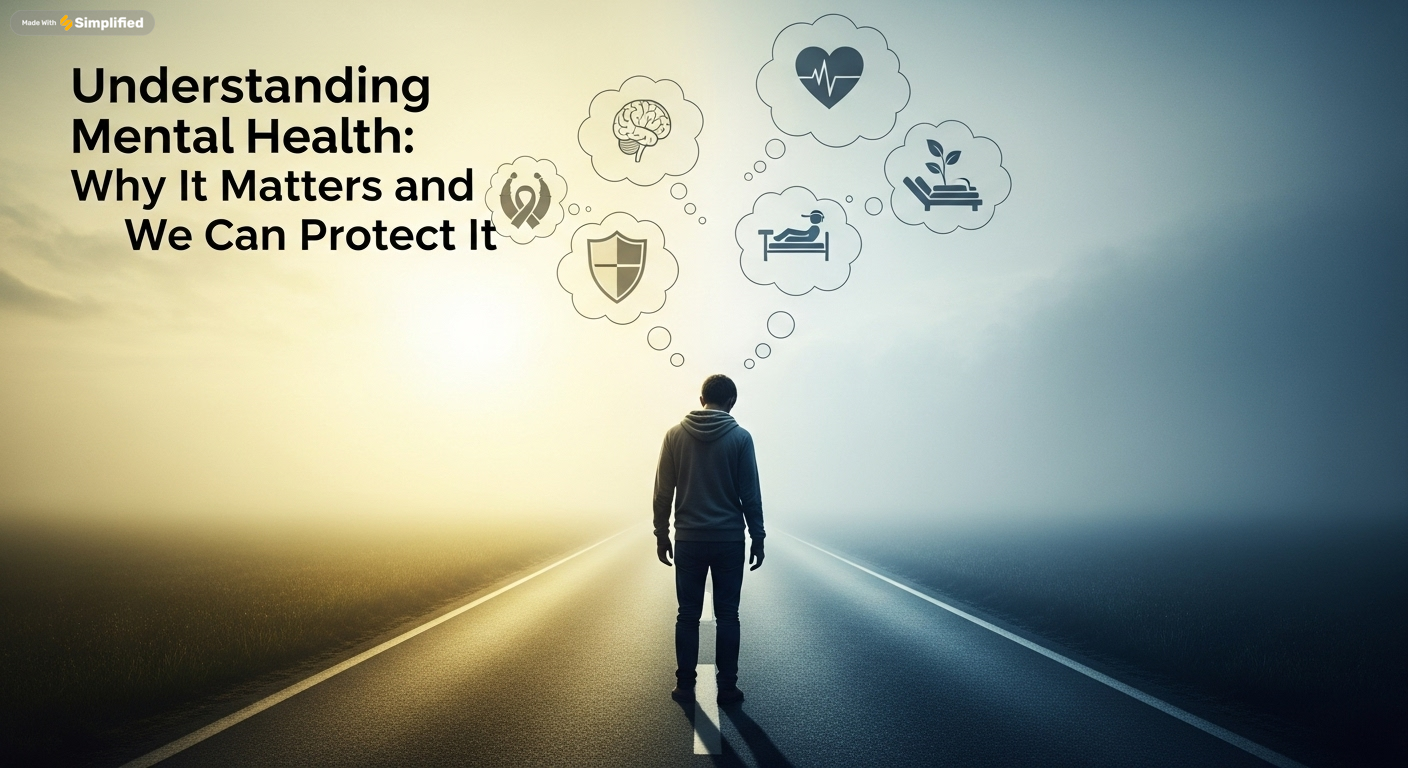
Understanding Mental Health: Why It Matters and How We Can Protect It
Mental health is one of the most important aspects of overall well-being, yet it is often overlooked or misunderstood. While physical health receives a lot of attention, our emotional, psychological, and social well-being is just as crucial. Good mental health affects how we think, feel, and act in everyday life. It also influences how we cope with stress, interact with others, and make decisions. Without it, even the healthiest body can feel burdened, and quality of life can quickly decline. In this article, we’ll explore what mental health really means, why it is vital, common challenges people face, and how individuals and communities can work together to protect and improve it.
Mental health goes beyond the absence of mental illness. It is a state of balance in which a person can manage life’s challenges, work productively, build strong relationships, and contribute to their community.
According to the World Health Organization (WHO), mental health is “a state of well-being in which every individual realizes their own potential, can cope with the normal stresses of life, can work productively, and is able to contribute to their community.”
This definition shows that mental health is not simply about avoiding disorders but also about thriving—feeling fulfilled, resilient, and capable.
Common Mental Health Challenges
Millions of people across the world experience mental health issues, and these can take many forms. Some of the most common include:
Anxiety Disorders
Anxiety is a natural response to stress, but when it becomes overwhelming, persistent, or triggers panic attacks, it may be an anxiety disorder. Symptoms often include excessive worry, restlessness, rapid heartbeat, and difficulty concentrating.
Depression
Depression is more than just sadness. It’s a serious condition that affects mood, motivation, and even physical health. People with depression often experience hopelessness, fatigue, changes in appetite, and loss of interest in activities they once enjoyed.
Post-Traumatic Stress Disorder (PTSD)
PTSD can develop after experiencing or witnessing traumatic events. It may cause flashbacks, nightmares, or intense fear responses, making it difficult for individuals to feel safe or connected to others.
Bipolar Disorder
Bipolar disorder involves extreme mood swings, ranging from depressive lows to manic highs. It can disrupt relationships, careers, and daily routines if left unmanaged.
Addiction and Substance Use Disorders
Many people use substances to cope with stress or trauma. Unfortunately, misuse can develop into addiction, which is both a mental and physical health issue that requires treatment and support.
Eating Disorders
Conditions such as anorexia, bulimia, and binge eating disorder affect not only a person’s physical health but also their self-esteem, emotions, and relationships.
Why Mental Health Matters
Mental health is directly tied to nearly every aspect of our lives. Poor mental health can lead to strained relationships, difficulty keeping jobs, poor academic performance, and even chronic physical illnesses. For example, stress and depression have been linked to weakened immune systems, heart disease, and other long-term conditions.
On the other hand, strong mental health contributes to:
Resilience: The ability to bounce back from setbacks and adapt to change.
Healthy Relationships: Positive communication and emotional connection with others.
Productivity: Better focus, creativity, and performance at work or school.
Quality of Life: A greater sense of purpose, joy, and fulfillment.
When we take mental health seriously, we not only improve individual lives but also strengthen communities and economies.
Breaking the Stigma
One of the biggest challenges in mental health care is stigma—the negative attitudes and stereotypes about mental illness. Many people hesitate to seek help because they fear being judged or misunderstood. Stigma can lead to silence, isolation, and worsening symptoms.
To break the stigma, society must treat mental health with the same importance as physical health. Education campaigns, open conversations, and supportive workplaces all help normalize the idea that it’s okay to not be okay—and it’s even better to ask for help.
Ways to Protect and Improve Mental Health
1. Practice Self-Care
Self-care involves daily habits that support emotional balance. Examples include getting enough sleep, eating nutritious meals, exercising regularly, and setting aside time for relaxation. Even small steps, like spending time in nature or practicing mindfulness, can boost mood and reduce stress.
2. Build Strong Connections
Humans are social beings. Maintaining supportive relationships with friends, family, or community groups provides a sense of belonging and reduces feelings of loneliness.
3. Manage Stress Effectively
Chronic stress can damage mental and physical health. Learning coping techniques such as meditation, breathing exercises, or journaling helps manage stress before it becomes overwhelming.
4. Seek Professional Help
Therapists, counselors, and psychiatrists are trained to provide tools and treatments that improve mental health. Therapy, medication, or a combination of both can make a significant difference for those struggling with conditions like depression or anxiety.
5. Limit Harmful Habits
Excessive alcohol, drug use, or even over-reliance on social media can negatively affect mental health. Being mindful about consumption and setting healthy boundaries reduces these risks.
6. Promote Mental Health at Work and School
Organizations and schools can play a vital role by creating safe environments, offering counseling services, and encouraging work-life balance. Supportive systems not only help individuals but also improve overall productivity and satisfaction.
The Role of Communities and Policy
Mental health is not just an individual responsibility—it’s a collective one. Governments, schools, and workplaces must invest in mental health resources, such as affordable therapy, crisis hotlines, and awareness programs.
Policies that reduce poverty, discrimination, and violence also indirectly improve mental health by addressing the root causes of distress. For example, access to affordable housing, healthcare, and education can significantly reduce the stress and anxiety that many people face.
Looking Ahead: A Healthier Future
The conversation around mental health has grown stronger in recent years, especially following the COVID-19 pandemic, which highlighted just how fragile mental well-being can be. While challenges remain, progress is being made. Celebrities, athletes, and everyday people are speaking out about their struggles, encouraging others to do the same.
Technology is also helping, with mental health apps, online therapy platforms, and virtual support groups making resources more accessible than ever before. The future looks promising if society continues to prioritize mental well-being alongside physical health.
Conclusion
Mental health is not a luxury—it is a necessity. Just as we care for our bodies, we must also nurture our minds. Everyone experiences ups and downs, but with awareness, compassion, and the right resources, we can all move toward better mental well-being.
By breaking stigma, supporting one another, and making mental health a priority in schools, workplaces, and policies, we can build stronger, healthier communities. The message is clear: mental health matters, and it’s time we treat it with the attention it deserves.


